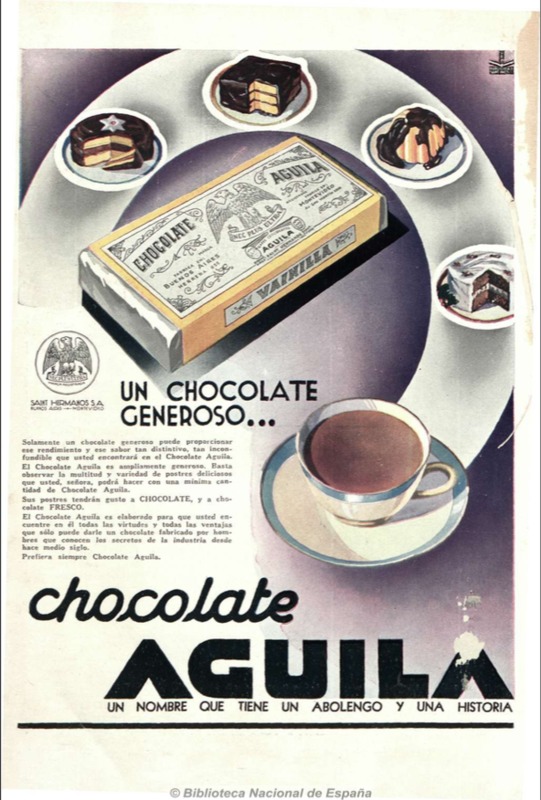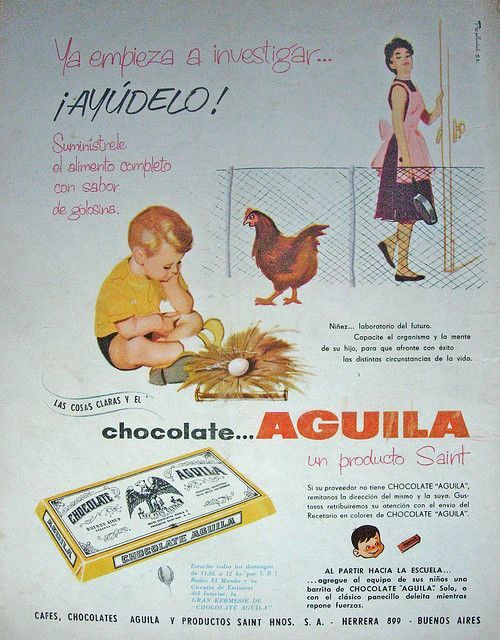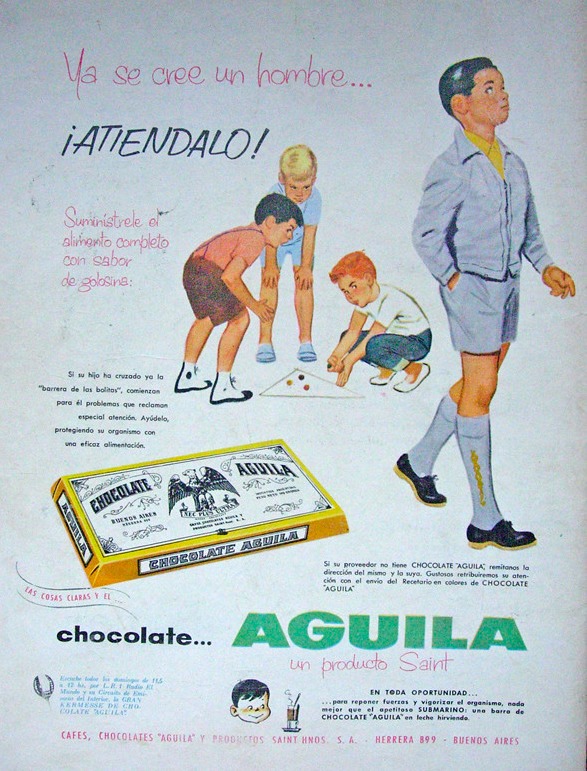Aguila Advertisements and Women from the 1930s to 1960s
The following images relate primarily to gender roles rather than nationalism, but they are also advertisements from chocolate Aguila. The brand created these images closer to the mid-1900s, which situates them prior to a surge in Latin American feminist activity and theory, but still at a time when feminist thought is present.
In 1934, Aguila produced the image to the left. As a refresher, at this point, neocolonialism was drawing to a close and ISI was taking off. Unfortunately for women, remnants of the past social hierarchies, the patriarchy, remained in place. The advertisement contains an illustration of an Aguila chocolate bar in the center with the different edible forms it could take surrounding it. The brand is clearly trying to demonstrate the versatility of its product through this tactic, but it is not inherently gendered. The text in the advertisement, however, is undoubtedly geared toward women: “Aguila Chocolate is very generous. It is enough to observe the multitude and variety of pastries that you, missus [Mrs.], could make with a minimal amount of Aguila Chocolate.” The company is likely calling out to heterosexual women and they intentionally call out to married women, rather than single women, because this is the audience that is inherently associated with men. With this writing, Aguila is utilizing a marketing tactic that historian Katherine Parkin claims food manufacturers used “to expand their market” because their products “demanded less time and effort from women,” but they are still performing their expected role (4).
Additionally, the second to last sentence reads, “The Águila Chocolate is manufactured so that you can find in it all the virtues and all the advantages that only chocolate made by men who have known the secrets of the industry for half a century can give you.” This is partially a nationalistic message being disseminated only a few years after the nationalist advertisements we have explored. Aguila Chocolate created this advertisement at a time of industrial take-off in Argentina, so the Argentine company claiming that their men have superior knowledge of production contributes to the idea of Aguila using industrialization as a source of nationalistic pride in their ads. The broader, gendered, concept of men as creators of good chocolate also stems from that second to last sentence. The chocolate brand expected good wives to serve the Argentine chocolate that is made by knowledgeable Argentine men to their husbands and possibly even family because “in the hands of women, food is love” (Parkin, 4).
Three decades later, advertising toward women involved their role as mothers. In the 1960s, Eva Perón, a leading and respected Argentine woman proliferated the idea of women as integral to the home and subservient to men. According to Chasteen, Eva believed that “a woman’s highest aspiration should be marriage and motherhood: ‘We were born to be homemakers, not to go around in the street.’ Evita never used the word leader to describe herself. ‘He is the leader,’ she said of her husband. “I am only the shadow of his superior presence” (273).
In accordance with Evita’s message, the 1960s advertisement to the right exhibits the expected role that women and chocolate had in relation to children and child-rearing. The advertisement calls out to women to help their children by supplying them with chocolate. The text starting from the top left states, “He already begins to investigate… Help him! Supply him with a candy-flavored, complete nutrition.” Under the image of the woman, it continues, “Childhood… laboratory of the future. Empower the body and mind of your child so that they can successfully face life’s circumstances.” And finally, in the bottom right corner, the advertisement states “When leaving for school... add a little Aguila chocolate bar to your children's gear.” All of these statements directed toward Argentine mothers are a call to action. They request that mothers be helpful, provide proper nutrition, and be thoughtful toward their children, creating an image of the desired female behavior in the mid 20th century. The mother in the advertisement is wearing an apron and holding a pan as she opens a door to walk into someplace. Through these subtle indicators, Aguila was suggesting that the place of a mother is in the domestic setting, more specifically, in the kitchen, where they can prepare food, chocolate, to better raise their children.
On the company’s side, this is an attempt to increase chocolate consumption by women and children by guilting women into being better parents and convincing families that chocolate is beneficial to health. Given the nature of advertisements and the presence of feminist activity, this depiction, and others like it are illustrative of the roles their patriarchal society expected women to perform rather than the roles that they may have actually been performing at the time.
A similar message is being sent with the advertisement to the left. As a single boy walks away from schoolboys playing on the ground with his chin held high, the text to the left of his head states the way he must be feeling: “He already thinks he’s a man… Attend to him!” Beneath this, Aguila repeats the exact same phrase of “Supply him with a candy-flavored complete nutrition.”
This advertisement’s impact is double-edged. Like the first image, it is somewhat indicative of the expected relationship between man and woman in Argentina. After the statement that the boy is becoming a man, the mother is urged to cater to him, positioning the woman once again as subservient. After this message, Aguila targeted the women as mothers like in the second advertisement. They are told, “Your son has already passed the ‘ball barrier’, problems are arising for him that require special attention. Help him, protecting his body with efficient nutrition.” This is an effort to persuade mothers into believing that they must do what is right for their children and help ease the transition from childhood into adulthood by providing chocolate for consumption.
Aguila advertisements to Argentine women were an attempt to illustrate the ideology of a patriarchal system that perceived women as valuable so long as they conformed to their expected domestic role. In this case, appealing to the idea of women playing the domestic role allows the company to establish its product as an Argentine household product by reassuring women that to properly perform within this system, their job is to serve chocolate at home.



